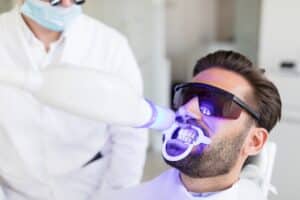If you have a winning smile and are proud to show it off whenever you can, you obviously take great pride in the care of your teeth and gums to ensure your smile remains brilliant. It is likely that you have a great dental hygiene regimen that you stick to every day to prevent any kind of oral health issue from bad breath to gum recession, tooth decay to bone loss, and everything in between.
Along with your regular home care, you should make sure that you get a professional cleaning every six months. Even after practicing diligent oral hygiene, you may not be able to get rid of all the plaque that accumulates on your teeth. This can cause a series gum disease known as periodontal disease. This can only be prevented with regular dental cleanings.
WHAT IS PERIODONTAL DISEASE?
Periodontal disease is a chronic inflammatory condition of the gums which may also affect the jawbone and can lead to tooth loss and overall systemic issues. Everything begins with the buildup of bacteria in your mouth and progresses from there.
After the onset of the disease, pockets are created when the inner layer of the gum and bone pull away from the teeth. These pockets then become infected when food and debris become lodged in them. Naturally, your body will start to fight the infection caused by bacterial invaders, and toxins produced by the bacteria begin to break down the bone and connective tissue which hold your teeth in place. The deeper the pockets become the more gum tissue and bone that is destroyed. You may also lose teeth entirely.
Bacteria can also enter the bloodstream through gum tissue and possibly have negative effects on your heart, lungs, and other parts of the body. Though more medical studies are needed to confirm the connection, periodontal disease may be linked with respiratory disease, heart disease, stroke, and rheumatoid arthritis.
SYMPTOMS OF PERIODONTAL DISEASE
During your regular teeth cleaning , be sure to take an assessment of your gums as well as your teeth. Healthy gums should be firm, pale pink, and fit snuggly around your teeth. Some signs and symptoms of periodontal disease include:
- Puffy or red swollen gums
- Red or purplish gums
- Tender gums
- Gums that bleed easily
- Receding gums (your teeth may start to look longer than you are used to)
- Spaces between your teeth which were not previously there or loose teeth
- Pus between your teeth and gums
- Halitosis
- Pain while chewing
- Changes in your bite
If you experience any of these symptoms, you should immediately contact a dentist providing periodontal disease treatment near you in Forth Worth, TX. The dentist or periodontist will provide a thorough assessment of your gums and draft a treatment plan for it.
HOW IS PERIODONTAL DISEASE TREATED?
A periodontist in Forth Worth, TX understands how important it is to treat periodontitis as soon as any symptoms are visible or there is any pain. During your initial visit, the dentist will examine your mouth, measure pocket depth (the groove between your gums and teeth) to see if it is deeper than 4mm, take dental X-rays to check for bone loss, and make a diagnosis. Depending on the advancement of your periodontal condition, treatment methods include:
- Deep cleaning (with scaling and root planing)
- Topical or oral bacteria-specific antibiotics
- “Flap” surgery (pocket reduction surgery)
- Soft tissue graft
- Bone graft (most severe of cases)
If you find your gums bleeding when you brush your teeth or spot more of the symptoms listed below, contact our team at ABC 123 Dental for periodontal disease treatment in Fort Worth, TX today!




